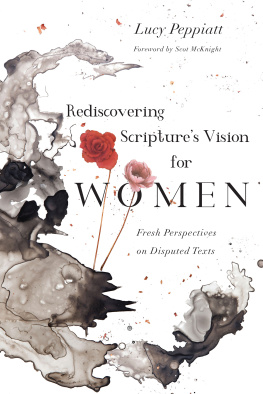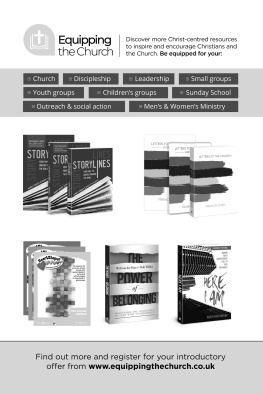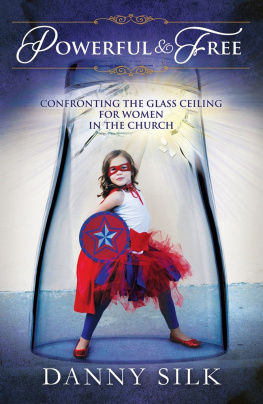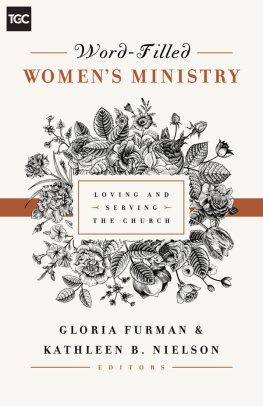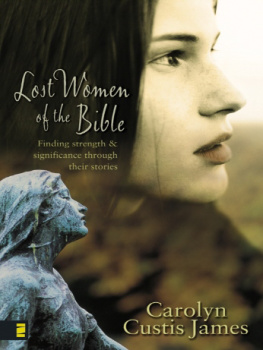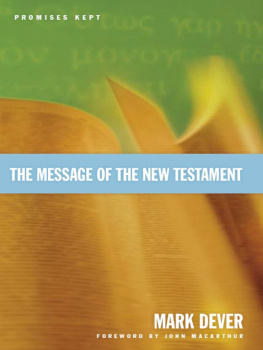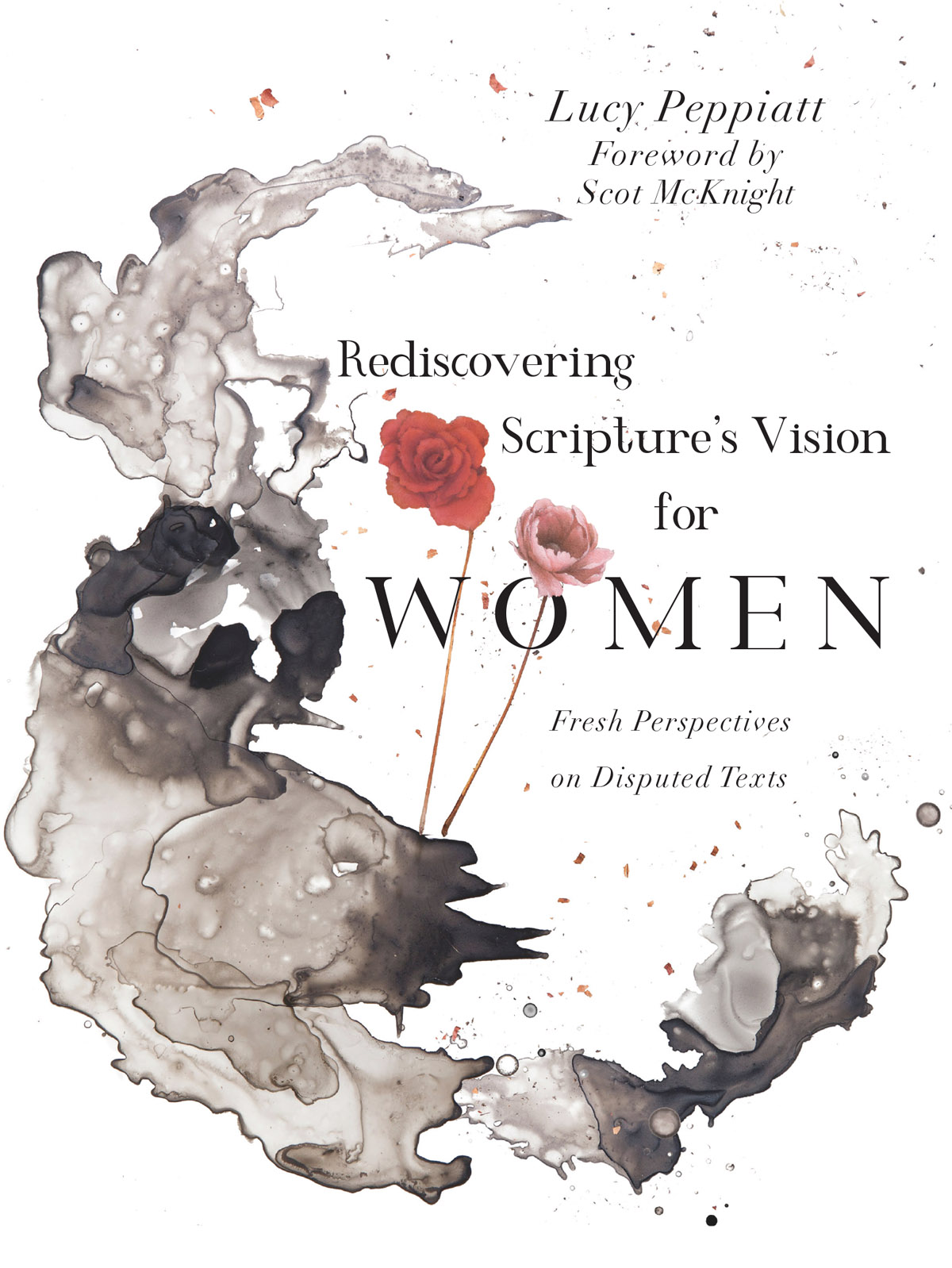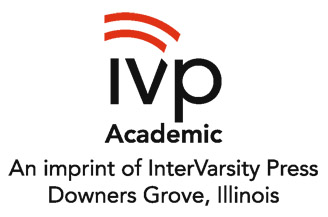All rights reserved. No part of this book may be reproduced in any form without written permission from InterVarsity Press.
Scripture quotations, unless otherwise noted, are from the New Revised Standard Version of the Bible,
copyright 1989 by the Division of Christian Education of the National Council of the Churches of Christ in the USA. Used by permission. All rights reserved.
Foreword
Scot McKnight
I GET ASKED LOTS OF QUESTIONS about the Bible, but perhaps my favorite goes like this: What in the Bible would you tell my church to think about if the leaders are considering more freedom for women in the churchs ministry? Ill make it seven questions to ponder as you consider what God is calling women to do in the church.
What did women actually do in the Bible (besides cook and tend to the little ones and farm and carry wood and make clothing, etc.)? Anyone asking this question needs to begin with Miriam in Exodus and then spend some time with that uber-tough Deborah and then take a hard long look at Huldah. How would you describe what they did? They sang, they led, they ran the nation, they led the military machine, and they spoke for God to the people of God. What else? The Proverbs 31 woman, as my friend Alice Mathews said to me recently, has more to say than most bother to hear. Then jump into the New Testament and ask what Mary did, and what Prisca/Priscilla did, and what Junia did. And what about those women leaders in Philippi, Euodia, and Syntyche? What did they do? One nurtured the Messiah, one taught the gospel to a male leader, one was nothing less than an apostle, and the others were co-workers with Paul, which is about as strong of an affirmation as one can get from Paul. Too often, too many, for too long have gone to the so-called submission passages not realizing they were creating more than a little contradiction in the very man who was working with these women in his mission. Paul knew what these women were doing when he wrote 1 Timothy 2 and he therefore didnt mean they couldnt do whats said about their doings.
Who are the major named women in the Bible? Once I spent some time with college students over coffee talking about two women, Junia and Phoebe. I went on as professors are wont to doperhaps a bit too longbut I was pumped. Near the end a female student was surprisingly irritated, and I thought it was with what I was saying, only to learn that she was ticked off with her church. Why? Her words, not mine: Why have I never heard about these women in my so-called Bible-preaching church? Exactly, I muttered to myself. Why? Far more know about the altogether unimportant names Methuselah or Ehud than know of Phoebe or the daughters of Philip. Each church today needs a series called Women of the Bible.
Who are the women theologians you read today, or who are on your bookshelves? Of course, if one is a bean counter and one has been collecting books as long as I havealmost fifty years nowone will not have a fifty-fifty ratio, but weekly I am sent books and more and more they are written by women, like my friend and scholar, Lucy Peppiatt. Others include Renita Weems, Haley Goranson Jacob, Morna Hooker, Amy-Jill Levine, Lynn Cohick, Marianne Meye Thompson, Carolyn Osiek, Beth Felker Jones, Beverly Gaventa, Ruth Haley Barton, Margaret Macdonald, Nancy Ortberg, Amy Peeler, Nancy Beach, Christena Cleveland... and Im old enough to say this list has grown exponentially in my life time. There was a time, well, when not many women were in this line of work, but that day has ended and their books ought to be on any respectable thinkers shelves.
Who are the women preachers you listen to today? A friend of mine once told me she was preaching at a church where no woman had ever preached. After a few times preaching an old man came up to her and informed her that, while he was formerly against women preaching, after listening to her he became convinced that women not only could preach but also ought to be preaching. I often ask my friends who are podcast listeners, Which women are you listening to? Fleming Rutledge? Mandy Smith? Barbara Brown Taylor? Tara Beth Leach? I know for me it was reading Morna Hooker as a PhD student that shook me out of lethargy about women as Bible teachers and theologians. I have heard others say it was listening to Billy Grahams daughter, Anne Graham Lotz, that made it clear women not only can preach but also ought to preach. Speaking of authors and preachers, Lucy Peppiatt, though not as well-known in the United States as she is in England, is both a wonderful theologian-author and also a dynamic teacher-preacher. Read her and listen to her.
Who are the influential moms in your church? When the roll is called up yonder and those on the list tell their stories about how they came to faith, the number one on the list will be moms. My mother told me about Jesus as a child, and in your church are moms singing to their babies, telling their children the gospel, and guiding the next generation into discipleship behind Jesus. This truth must be told: if we relied totally on males... Ill not complete that sentence, but I will say this unabashedly: moms are the number-one reason why the church has grown and is growing. Anyone who thinks women cant teach, preach, or instruct others in the faith needs to take a long look at the moms in church and then apologize for foolishness. Moms are evangelists, catechists, teachers, and preachersfrom the house to the church.
Which texts in the New Testament need to be explored the most in their historical context? I became aware of the careful theological and biblical work of Lucy Peppiatt when I read a small book of hers about 1 Corinthians 11:2-16. In that book Lucy made it abundantly clear that not only were there a bewildering list of possible interpretations of vexing expressions like headcoverings and what head means, but the interpretations many were suggesting were flat-out contradictions of either the Bible itself or of one another. She offered a different question: What if the problem isnt the women but the men? And she offered a different solution: some of these lines that dont fit our theology dont fit into the Bible because they were the words of Pauls opponents being quoted. She had me there, and I have followed her work ever since. This book will introduce you not only to her reading of 1 Corinthians 11 (and 14, by the way) but also to her approach to many issues. I am so grateful to Lucy for this wonderful packaging of all her best ideas about women in the Bible and church. Shes probably got more, so take this as a sampling.

